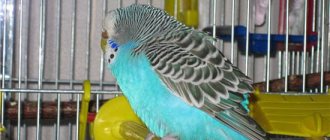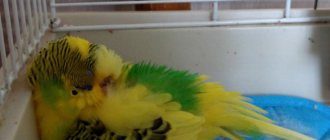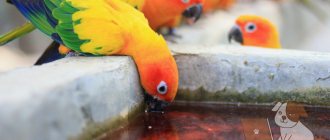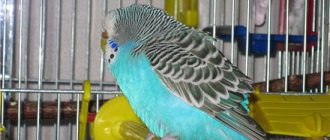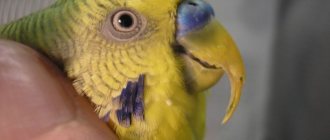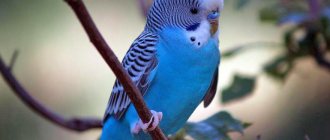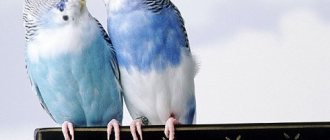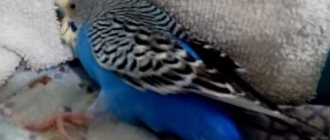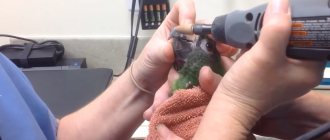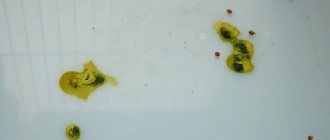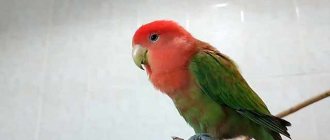The largest percentage of visitors to the RosVet Exhibition Center are “standard” pets, dogs and cats. But there are also “exotics”, reptiles, monkeys, parrots of different breeds, sizes and colors. Bird owners who encounter liquid feces from birds for the first time believe that unformed feces are a sign of internal pathology that requires immediate treatment. Is it so? Specialists at the veterinary clinic will help you understand the aspects of a parrot’s body and situations where the help of an ornithologist is absolutely necessary.
Diarrhea in a parrot: norm and pathology
Unlike animals in which urine and feces are not combined together, poultry droppings consist of:
- uric acid salts;
- feces;
- liquid part (analogous to urine).
The final fraction is normally soft, since the liquid component predominates. Too tight litter is the result of a small intake of water into the parrot’s body, when the breeder forgets to give him something to drink or the water does not change daily.
It is considered normal for droppings to be slightly runny, if they retain the color, shape and consistency characteristic of this particular type of parrot. In this case, the bird may drink a lot of water or eat an excessive amount of succulent feed, which is explained by the symptom of “polyuria”.
Also, changes in the consistency of droppings during oviposition, the breeding season, changes in living conditions and feeding are not considered a pathology. Here it is enough to return the bird to its usual way of life and everything will work out.
Pathological variants
If the parrot gets an infection, or has liver and kidney diseases, or a lack of minerals and vitamins, the consistency of the stool changes. To find out the reason for the changes, you need to contact a veterinarian ornithologist at the RosVet VC. The specialist will prescribe fluoroscopy and blood tests (biochemistry, OKA).
Diarrhea in poultry is considered a condition when the consistency, color, and smell of feces change critically. They often contain pathological impurities: blood, mucus, particles of undigested food. The worst option is foamy and very watery contents.
Causes of loose stools in a budgie
Don't be alarmed if you sometimes notice a lot of moisture in bird droppings. This happens when a parrot drinks boiled water and feasts on juicy fruits, which weaken the intestines. The bird itself feels good, moves a lot, chirps. You should suspect something is wrong if the nature and frequency of bowel movements changes sharply: impurities of foam, blood, and mucus appear in the stool. Liquid droppings become green, white or yellow in color, and the smell becomes unbearable.
Main causes of diarrhea:
- Spoiled food. A new batch of grain feed turned out to be of poor quality, with mold or mildew. The parrot ate sour fruit or drank stagnant water.
- Poisoning. The feathered pet inhaled toxic aerosol fumes, tasted the leaf of a houseplant, and stole a prohibited product from a common table.
- Infectious diseases. The parrot caught the virus at the veterinary clinic or a bacterial infection developed due to a weakened immune system.
- Goiter inflammation. Disturbances in the digestive system lead to vomiting and diarrhea. This dangerous condition of the body requires immediate medical intervention, otherwise the bird will die.
- Infection with helminths. Where hygiene and disinfection rules are not followed, there is a very high risk of contracting worms and other parasites.
- Stress. The fragile psyche of a budgerigar cannot withstand nervous tension. Worrying about any reason puts the bird out of balance, and the body reacts to stress with the appearance of diarrhea.
A parrot treated with antibiotics may suffer from side effects such as diarrhea. Lack of vitamins and enzymes, pathologies of the gastrointestinal tract, chronic inflammation of the liver, problems with the organs of the endocrine system - all these diseases cause stomach upset in pets.
Symptoms: what might the owner notice?
With diarrhea, the bird changes its behavior. This is immediately noticeable, so the breeder must respond to the changes in a timely manner and call/visit the clinic to a veterinarian ornithologist.
Parrot with diarrhea:
- looks sleepy, apathetic;
- loses activity;
- stops flying, sits ruffled;
- may tremble.
A characteristic feature is that the bird does not sit on a perch or vertically on the bars of the cage, but on the bottom, tray, or corner. Refuses water and food, does not respond to the owner's calls, stroking, toys.
The plumage does not fit tightly to the body; the feathers around the cloaca are dirty.
Possible complications
Diarrhea that does not stop for several days poses a threat to the health and life of the parrot:
- food is not digested, nutrients do not enter the cells;
- the body loses a critical amount of moisture;
- blood thickens and circulates poorly;
- decay products remain in the cells, intoxication occurs;
- the functioning of life systems is disrupted;
- all internal organs suffer.
One of the most terrible consequences of diarrhea is prolapse of the cloaca. Due to frequent bowel movements, the sphincter is stretched and the cloaca is partially everted. The mucous membrane dries out, which causes a lot of unpleasant sensations for the parrot. The bird itches frantically, pecks at its skin, and constantly experiences discomfort.
List of possible causes of diarrhea
Diarrhea in a parrot does not just happen; more often it is the result of improper maintenance and inattention of the owner. Mistakes a breeder makes:
- provides expired, low-quality feed;
- allows eating “human” food from the table;
- abruptly changes food;
- gives treats intended for birds, but too sweet, with additives of poor quality.
One of the significant mistakes is drinking bowls in which the water is changed less than once a day. Plastic containers very quickly make water unusable, it turns sour, and pathogenic bacteria multiply in it. Therefore, the water is changed 1-2 times a day, and once every 3-4 days it is recommended to rinse the drinking bowl well or boil (sterilize) for 10-20 minutes. In a house where parrots are kept, you should not plant flowers that are poisonous to birds or place food products in accessible places. If the parrot flies freely around the apartment, it is necessary to hide everything that could cause gastrointestinal upset, poisoning, etc.
The cause of diarrhea can also be failure to maintain the temperature in the living room, placing the cage in a draft, in noisy places or where the bird can get severe stress (sharp sounds, cats, dogs). The absence of an ultraviolet lamp also harms the health of the bird, especially if the owner and the parrot live in an area where there are few sunny days (North Russia).
It is important to know! Antibiotic therapy, internal parasites (worms), infectious and non-infectious diseases often cause diarrhea. Therefore, you need to show the parrot to an ornithologist and conduct a full examination, identifying/excluding factors that provoke diarrhea.
Possible consequences
Almost every “parrot” disease, left unattended and without an appropriate response, can lead to the most dire consequences. An ordinary intestinal disorder, accompanied by frequent and copious bowel movements, becomes the cause of real dehydration. Also, prolonged diarrhea is the main enemy of proper metabolism, the violation of which will lead to the almost immediate death of the pet.
Among other things, diarrhea is one of the most common symptoms that signal the presence of all sorts of dangerous pathologies. Remember that constipation in a budgie is the same disease and unpleasant problem as diarrhea. If any stomach upset occurs, the bird will behave slightly inappropriately, needing the owner's support. If your parrot doesn't poop, try giving him Linex or Smecta. You can read about how to properly give smecta to a parrot in the corresponding article.
Remember that an excessive number of disorders acquired by a parrot will affect the condition of its esophagus.
What can and cannot be done at home?
The parrot can be warmed under an incandescent lamp or on a hot (up to 40 C) heating pad if it is clearly trembling or ruffled. The exception is when there is visible or hidden blood in the litter (internal bleeding, which increases with warming). It can be detected by dropping hydrogen peroxide on the excrement. With blood it gives a profuse foamy reaction.
Usually the parrot is placed in a box, a lamp/heating pad is placed, space is needed so that the bird can move away from the heat source if it overheats.
The option of force-feeding birds remains controversial. The owner will not find out what exactly caused the diarrhea at home, and even feeding the recommended food does not always give a positive result.
Therefore, veterinarians at the RosVet VC advise calling an ornithologist to your home at the first sign of illness so that he can examine the bird. Transport to the clinic in such situations can cause additional stress and deterioration of the condition, and only when the doctor recommends placing the parrot in a hospital for observation is it advisable to accept the recommendations.
If your parrot begins to walk loosely (diarrhea), or additional signs of illness appear - do not hesitate! Call the RosVet VC, calls are accepted 24 hours a day. The team is called to your home 24 hours a day at a time convenient for the owners of animals and birds.
How to cure a parrot
Owners are sometimes lost and don’t know what to do if their budgie has diarrhea. In most cases, stool returns to normal without intervention, but sometimes inaction leads to disastrous results. In difficult situations, when the bird is severely exhausted, only a doctor can save it.
You can treat your parrot's diarrhea at home, but you need to act immediately. Debilitating diarrhea causes chills and lethargy in the bird, so the first thing the bird needs for a speedy recovery is rest in silence and sound sleep. Create a positive atmosphere and then begin therapy.
Basic treatment methods
In your home medicine cabinet there will always be available items that you can use. When a budgerigar has diarrhea, treatment begins with adsorbent drugs: activated carbon, enterosgel, smecta. They bind toxic substances in the stomach and then remove them from the body. The tablet is crushed into powder and added to the grain, slightly moistened with water.
In addition to medications used to treat humans, veterinary drugs are successfully used in birds. Karsil tablets protect the liver from toxins. Half of the tablets are mixed with food and given to the pet twice a day for at least a week.
Gamavit, an immunomodulator, has a general strengthening effect. It is diluted in water at a dosage of 0.5 ml per 50 ml. The treatment course is one week. Vetom 1.1 has a preventive effect for birds; it eliminates gastrointestinal disorders.
The best way to cure a parrot is to consult a veterinarian, because... Only he can correctly diagnose and prescribe treatment!
Caring for a parrot and its cage
When a parrot has loose stools, what should be done first is hygiene procedures. Frequently defecating and sitting on a soiled perch, the bird touches the droppings with its feathers. The area under the tail can be very dirty and the feathers stick together. Excrement irritates the skin of the cloaca, it becomes inflamed. It is very simple to relieve a bird from suffering: gently wash the area around the cloaca with a warm infusion of chamomile, which soothes the skin. After bathing, the pet is helped to dry off and then placed in a clean cage.
To quickly cure a parrot from diarrhea at home, you must not forget about regular cleaning. The cage and accessories should be cleaned daily.
Important! If you do not pay special attention to hygiene, your budgie will get sick again and again, since the source of the disease has not been eliminated.
Diet correction
An important point: what to do with feeding if the parrot is diarrhea. Until the cause of diarrhea is determined, the feathered patient is prescribed a diet. Only grain feed and water-based cereals are left in the diet. The box of food that you started cannot be used anymore; it is advisable to buy a high-quality mixture with a predominance of millet.
You can also treat diarrhea in your budgie at home using herbal remedies. Blueberries, chamomile, St. John's wort - these plants have long been known as natural healers. It is useful to give rice water. It envelops the stomach, has a strengthening effect, and stops diarrhea.
Treatment with medications
Medications should only be prescribed by an ornithologist after diagnosis. This will require an examination of the bird and analysis of the droppings in the laboratory to identify the pathogen. So that the doctor can assess the appearance of the feces, it would be better to call him at home or at least take a photograph of the droppings. Most human medications are not suitable for your pet and may worsen his condition.
Treating a parrot for diarrhea.
Depending on the cause of the parrot’s disease, antibiotics or antimicrobials, antimycotics for fungal infections, and agents that suppress the vital activity of parasites will be prescribed.
To replenish fluid loss and restore electrolyte balance, the bird needs to drink a lot of baby bottled water and special preparations for rehydration. At the same time, probiotics are prescribed, for example, Vetom 1.1, Linex.
To maintain the parrot's strength, he is given an infusion of chamomile and St. John's wort, which also have an antiseptic effect. It is necessary to take sorbents, for example, charcoal. Immunomodulators such as Gamavit are also used.
To maintain the function of the liver, which neutralizes toxins during illness, you can give your parrot Karsil. To improve metabolism, exhausted birds are prescribed metabolic agents: Elcar or others.
Temporary liquid droppings in a parrot. When this is normal and does not require treatment.
Let's understand the problem
What does a change in litter color indicate?
The appearance of the droppings greatly depends on the food offered to the bird. Normally, stool is worm-shaped, dense in consistency and brown-green in color. In addition to the thick part, there is also a small white fraction consisting of urea and a small amount of clear liquid around the feces.
How to treat parrots for diarrhea, etc. Lighting.
In case of intestinal disorder, first of all, pay attention to the color of the droppings, as well as the presence of undigested food residues in it. Often, based on this sign, one can already suspect which processes are disturbed in the bird’s body.
This information will help in making the correct diagnosis.
Black litter
Black stool is a very alarming symptom. It may indicate bleeding in the upper digestive tract. Moving on, the blood is digested and darkens.
When rotting, undigested food also turns black.
The reason for this may be obstruction or volvulus of the intestines, inflammation of the walls and peritoneum. Due to the large amount of toxic breakdown products entering the bloodstream, the pet’s condition quickly deteriorates. He may die.
Green loose stool
Green droppings indicate a disruption of the intestines caused by poisoning with low-quality food, water or inedible substances.
What to do if your pet has diarrhea
This phenomenon is also typical for a number of infectious diseases. In these cases, toxins are formed due to fermentation in the intestines of waste products of pathogenic microorganisms or parasites. A green tint can be observed with dysbacteriosis.
White diarrhea
The reason for the increase in the proportion of the white fraction in the parrot's feces is associated with a disorder of protein metabolism. This happens when the pancreas is damaged, gout.
Diarrhea with blood
A red color in feces does not always indicate the presence of blood in it. It is possible that the day before your pet ate a lot of carrots or beets, which stained the stool.
A drop of hydrogen peroxide will help detect blood in the droppings; it will hiss when it comes into contact with it.
Changing the color of a parrot's droppings. Why this might happen.
Red diarrhea is observed with helminthic infestation, inflammation in the lower parts of the digestive tract and cloaca.
Change in consistency
If the droppings become watery, this does not always mean that the bird has diarrhea. A large amount of liquid enters the feces when feeding with succulent foods, as well as during the egg-laying period. Excitement should cause the condition to worsen against the background of liquid stool. The parrot is sleepy, thin, unkempt. In this case, the bird needs to be heavily watered and treated with special medications.
If you notice blood in your feces, this is almost always a reason to immediately consult a doctor. The cause may be injury to the cloaca and lower intestines. She could have been injured by too dense feces or during egg laying. If the case is isolated, then perhaps there are no serious problems. But if blood is released in the stool every time, you need to be wary.
Paying close attention to your pet will help you notice the problem in time and seek help. In some situations, this will help save the pet’s life and restore its health. That is why even such seemingly small things are very important.
The dangers of ignoring a problem
Any signs of ill health of a feathered friend should alert its owner. A common intestinal disorder for a bird can have fatal consequences.
Due to the large loss of fluid in the bird’s body, dehydration quickly develops, metabolism is disrupted, and the parrot can die within 24 hours. In addition to the danger posed by the presence of diarrhea in itself, you need to remember that this is a common symptom of serious diseases. Among them there are some that are very dangerous to human health.
How does a bird behave when it has bowel movements?
Along with loose stools, minerals, nutrients, and water are quickly removed from the body. Because of this, metabolism in organs and tissues is disrupted, and dehydration develops.
Parrot behavior when stool is disrupted
In addition to diarrhea, birds experience weakness, lack of appetite, and possible excessive thirst. In a serious condition, coordination is impaired, fever develops, and chills appear.
The disease can even lead to the death of a cockatiel or a budgie, because the smaller the bird, the faster the metabolism occurs in its body. The course of the disease can become complicated in birds of any species, and without human help the consequences will be disastrous.
Surrounding the bird with warmth
A weakened bird needs to be warmed up. Fever and excessive fluid loss may cause your pet to shiver. To help him, install an infrared lamp or 60 W incandescent lamp on the roof of the cage.
Leave a small part of the space shaded in case your pet gets hot or wants to hide from the light. However, if there are signs of bleeding, heating your pet is strictly prohibited. These include red or black stool.
THE PARROT HAS LIQUID STOOL, WHAT TO DO
Normal litter
The parrot's excretory system works in such a way that urine and feces are released simultaneously. Digestion of food in a parrot occurs very quickly; it defecates 30 to 50 times per day.
If the bird is healthy, then its excrement is a brownish or greenish curl. The impurity is a clear liquid, this is urine, and light beige inclusions are urates.
Consistency is determined by the type of food consumed. When eating grains and cereals, the excrement will be dense. If the diet is rich in greens and fruits, then there will be abundant urine impurities in the stool.
If the color of the stool, its volume or consistency has changed dramatically without changing the diet, you should be wary; most likely, something is wrong with the parrot.
